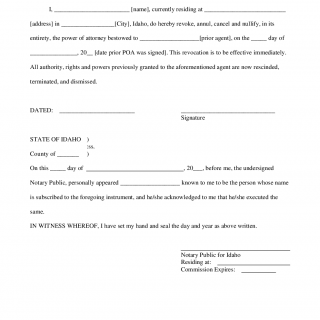Revocation of Power of Attorney
A Revocation of Power of Attorney form is legal document is used to officially revoke a previously established power of attorney, which grants another person the authority to act on behalf of the principal.
The form consists of several parts, including the identification of the parties involved, the effective date of the revocation, and a clear and concise language that expresses the principal's intentions to revoke the power of attorney. It's important to ensure that the form clearly identifies the power of attorney that is being revoked, including the name of the agent and the scope of their authority, to avoid any confusion or potential disputes later.
This form is typically drawn up when the principal wishes to terminate a power of attorney that is no longer serving its intended purpose or in situations where the principal wishes to terminate the authority of the agent. Some common reasons for revoking a power of attorney include mistrust or a change in circumstances, such as a newly diagnosed health condition or a change in living arrangements.
The main parties involved in this document are the principal who is revoking the power of attorney and the agent who was previously granted that power. It's important to consider any potential legal or financial consequences of revoking a power of attorney and to take steps to protect the principal's interests.
When compiling this form, it's important to closely follow any legal requirements or formalities that apply to your jurisdiction. For example, some states or countries require the revocation to be notarized or witnessed by a neutral third party. A legal professional can help you navigate these requirements and ensure that the revocation is properly executed.
The advantages of this form are that it allows for a clear and formal termination of a power of attorney, which can help to avoid confusion or disputes among parties involved. It also allows the principal to take control of their affairs and make their own decisions after the revocation.
However, filling out the form incorrectly or failing to follow proper legal requirements can lead to issues such as a dispute about whether the power of attorney was properly revoked, financial or legal losses for the principal, or even legal liability for the revoking party. It's important to work with a legal professional when drafting and executing a Revocation of Power of Attorney form to ensure that all legal requirements are met and that the document accurately reflects the principal's intentions.

